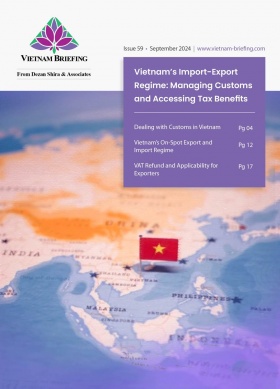Vietnam’s Amended Pharmaceutical Law: Navigating the Key Changes
Vietnam’s amended Law on Pharmacy, set to take effect on July 1, 2025, introduces key reforms to modernisze the pharmaceutical sector. The new provisions expand e-commerce sales, streamline drug registration, enhance market access for foreign-invested enterprises (FIEs), and improve price transparency. These changes aim to foster investment, boost local manufacturing, and ensure greater efficiency in drug distribution and regulation.
Vietnam’s pharmaceutical sector is undergoing a significant transformation with the recent amendment of the Pharmaceutical Law, which revises the 2016 version. Approved by the National Assembly on November 21, 2024, the updated law is set to take effect from July 1, 2025. These amendments introduce comprehensive changes aimed at enhancing domestic pharmaceutical production, regulating pharmacy chains, expanding e-commerce opportunities, and providing greater clarity on the rights of foreign-invested enterprises (FIEs).
One of the primary objectives of the revised law is to strengthen Vietnam’s pharmaceutical industry by encouraging technology transfer, incentivizing local manufacturing, and facilitating investment in research and development. Additionally, it formally defines and regulates pharmacy chains, a business model that was mentioned but not previously addressed in detail. With the rapid digitalization of retail services, the amended law also sets new standards for e-commerce pharmaceutical sales, ensuring compliance with electronic transaction regulations and consumer protection measures.
For foreign pharmaceutical companies, the law brings greater operational flexibility, clarifying their ability to purchase and distribute drugs produced via technology transfer, and expanding their rights in logistics and transportation—an area that was previously subject to legal uncertainty.
These reforms are expected to reshape Vietnam’s pharmaceutical landscape, offering new opportunities for investment, industry expansion, and improved consumer access to medicines. The following sections will delve into the key amendments and their broader implications for businesses and the market.
In this article, we examine the key amendments introduced by the 2024 revision of Vietnam’s Pharmaceutical Law and their implications for the industry.
Background: The 2016 Law on Pharmacy
Vietnam’s 2016 Law on Pharmacy served as the primary legal framework governing the pharmaceutical sector, covering drug registration, manufacturing, distribution, importation, and pricing regulations. The law aimed to enhance pharmaceutical management, ensure drug safety, and promote the development of Vietnam’s pharmaceutical industry. However, as the industry evolved and new challenges emerged, several limitations in the law became apparent, necessitating amendments to align with international standards and industry needs.
One of the key aspects of the 2016 law was drug registration, which required a lengthy approval process. Although provisions allowed for reference-based registration, the procedures remained complex, contributing to delays in bringing new drugs to market. Additionally, FIEs were subject to strict limitations on drug importation, distribution, and technology transfer, restricting their ability to fully participate in the pharmaceutical supply chain.
The 2016 law also lacked clear regulations for e-commerce pharmaceutical sales, leaving an increasing segment of the market unregulated. Furthermore, while the law provided a foundation for pharmacy chains, it did not offer specific guidelines on their operation, creating uncertainties for businesses looking to expand through chain models.
Moreover, drug price management was another challenge under the 2016 law, as it imposed strict price declaration and control mechanisms, requiring importers and manufacturers to notify authorities of wholesale drug prices before market entry. However, price transparency and stability remained key concerns.
Recognizing these challenges, the 2024 Amended Pharmaceutical Law was introduced to streamline administrative procedures, encourage investment, regulate e-commerce sales, and create a more transparent pricing system.
Key highlights of Vietnam’s Amended Pharmaceutical Law
Vietnam’s 2024 Amended Law on Pharmacy introduces several significant changes to modernize the country’s pharmaceutical sector, simplify regulatory processes, and align with international standards.
Below are the key changes and their implications:
|
Vietnam’s Amended Pharmaceutical Law |
||
|
Area |
Key changes |
Impact |
|
Expansion of e-commerce pharmaceutical sales |
|
|
|
Expanded rights for FIEs |
|
|
|
Simplification of drug registration -procedures |
The renewal process for drugs and raw materials is simplified, requiring only: 1. Application form Valid Certificate of Pharmaceutical Product (CPP) for imports 2. Report on drug safety and effectiveness during circulation Drugs granted a five-year marketing authorization (MA) but not marketed within that period are exempt from renewal requirements. If a drug’s MA expires but a renewal application is pending, the MA remains valid until approval or official rejection.
|
|
|
Streamlining drug importation rules |
|
|
|
Stricter drug price management and transparency |
|
|
|
Transitional provisions for businesses |
|
|
Key takeaways from Vietnam’s amended Law on Pharmacy
The 2024 amendments to Vietnam’s Law on Pharmacy introduce significant regulatory changes aimed at streamlining processes, enhancing market access, and increasing transparency. Below are the key highlights of the new provisions:
- Legalization of e-commerce sales: Non-prescription drugs can now be sold via online platforms, expanding access while maintaining restrictions on controlled substances.
- Greater market access for FIEs: Foreign-invested enterprises (FIEs) gain new rights to repurchase and distribute locally manufactured drugs, import raw materials, and transport clinical trial drugs.
- Faster and simpler drug registration: Reference-based approvals are shortened to 9 months; renewal applications require fewer documents; expired marketing authorization remain valid during renewal processing.
- Clinical trial drug imports simplified: Non-marketed drugs (except controlled substances) can be imported for clinical trials without requiring an import license, with the Ministry of Health (MOH) oversight.
- Stronger price transparency measures: Drug manufacturers and importers must declare wholesale prices before market entry, with MOH publishing the information online for public access.
- Smooth transition for businesses: Pending applications before July 1, 2025, follow the 2016 law unless applicants opt for the 2024 amendments, ensuring regulatory continuity.
About Us
Vietnam Briefing is published by Asia Briefing, a subsidiary of Dezan Shira & Associates. We produce material for foreign investors throughout Asia, including ASEAN, China, and India. For editorial matters, contact us here and for a complimentary subscription to our products, please click here. For assistance with investments into Vietnam, please contact us at vietnam@dezshira.com or visit us at www.dezshira.com.
Dezan Shira & Associates assists foreign investors throughout Asia from offices across the world, including in Hanoi, Ho Chi Minh City, and Da Nang. We also maintain offices or have alliance partners assisting foreign investors in China, Hong Kong SAR, Dubai (UAE), Indonesia, Singapore, Philippines, Malaysia, Thailand, Bangladesh, Italy, Germany, the United States, and Australia.
- Previous Article Vietnam and Czechia Elevate Relations to Strategic Partnership
- Next Article Industrial Zones in Vietnam: 2025-2030 Growth Outlook
































